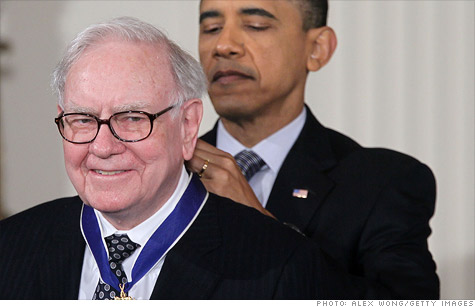
Washington spent Friday debating whether or not Warren Buffett likes his own tax plan.
NEW YORK (CNNMoney) -- Warren Buffett's words were used Friday by lawmakers to score petty political points -- exactly the kind of rhetoric he is asking Congress to put aside.
At issue: Whether or not Buffett likes a White House tax proposal that the billionaire investor himself came up with and lent his name to.
Republicans seized on interviews conducted Friday morning in which Buffett supposedly "disavows," "disagrees with" or "declines to support" the tax plan that bears his name.
"Tough day for the White House -- Warren Buffett not so much a fan of President Obama's Buffett Rule. Yeeesh," House Majority Leader Eric Cantor's spokesperson said on Twitter.
Sen. Jeff Sessions' office sent an e-mail making light of the interview, as did the Republican National Committee.
But if you listen closely to what Buffett said, there actually wasn't any difference between what Buffett wants and the White House proposal.
First, a primer on the White House's Buffett Rule: It's a guideline to ensure that those making more than $1 million do not pay a lower overall tax rate than those who earn substantially less money.
For most people, wages make up a majority of their income, so when they get a raise their average tax rate may go up.
But millionaires -- and in Buffett's case, billionaires -- typically have several sources of income, some of which are taxed at lower rates, if at all.
As a result, Buffett says he enjoys a lower tax rate than his secretary. Correcting that discrepancy is the aim of the Buffett Rule.
Now, for one of the exchanges that Republicans -- and some media outlets -- pointed to as evidence Buffett doesn't like his own plan:
CNBC: "Are you happy with the way it is being described? Is the program that the White House has presented, a million dollars and over, your program?"
Buffett: "Well, the precise program which will -- I don't know what their program will be. My program would be on the very high incomes that are taxed very low. Not just high incomes. Somebody making $50 million a year playing baseball, his taxes won't change. Make $50 million a year appearing on television, his income won't change. But, if they make a lot of money and pay a very low tax rate, like me, it would be changed by a minimum tax that would only bring them up to what other people pay."
In other words, Buffett said he doesn't know the precise White House proposal. That makes sense, because it exists only in outline form. He then described his plan, as he has in the past.
The interviewer then switches gears, and asks Buffett about the American Jobs Act, which is President Obama's jobs bill. Buffett says he won't discuss it, and then again describes the Buffett Rule.
CNBC: "Does that mean you disagree with the president's new jobs proposal, which would be paid for by raising taxes on households with incomes of over $250,000?"
Buffett: "That's another program that I won't be discussing. My program is to have a tax on ultra-rich people who are paying very low tax rates. Not just all rich people. It would probably apply to 50,000 people in a population of 300 million."
Here is what White House economic adviser Gene Sperling has written about the Buffett Rule:
"The Buffett Rule is not about all taxpayers or even the average taxpayer making over $1 million. Instead, it is about those who are able to pay lower taxes than middle-class families," Sperling said.
That's exactly what Buffett has proposed.
Here is another exchange from the same interview that makes clear Buffett is on board.
CNBC: "Let's talk about the Buffett Rule for a moment. Tell me about how it came about in terms of the White House getting in touch with you and you putting your name to this."
Buffett: "Well, Gene Sperling called and said, 'Can we use your name?' And I said 'yes.' "
CNBC: "Are you happy you said yes?"
Buffett: "Sure."
In an interview with CNN on Friday, Buffett was asked what it will take to get the economy back on track. Part of his solution: Less bickering, and more cooperation in Washington.
"It's going to take the cooperation of Congress and the administration," he said. "The problems over raising the debt limit were a disgrace ... and [people] have not been given much reason to feel confidence in terms of how Congress has generally behaved in recent months."
Your move, politicians.�![]()
First Published: September 30, 2011: 5:34 PM ET
Source: http://rss.cnn.com/~r/rss/money_topstories/~3/dGM8o7Yt540/index.htm
finance news economic news world us news about us business business news news latest news us news key news
No comments:
Post a Comment